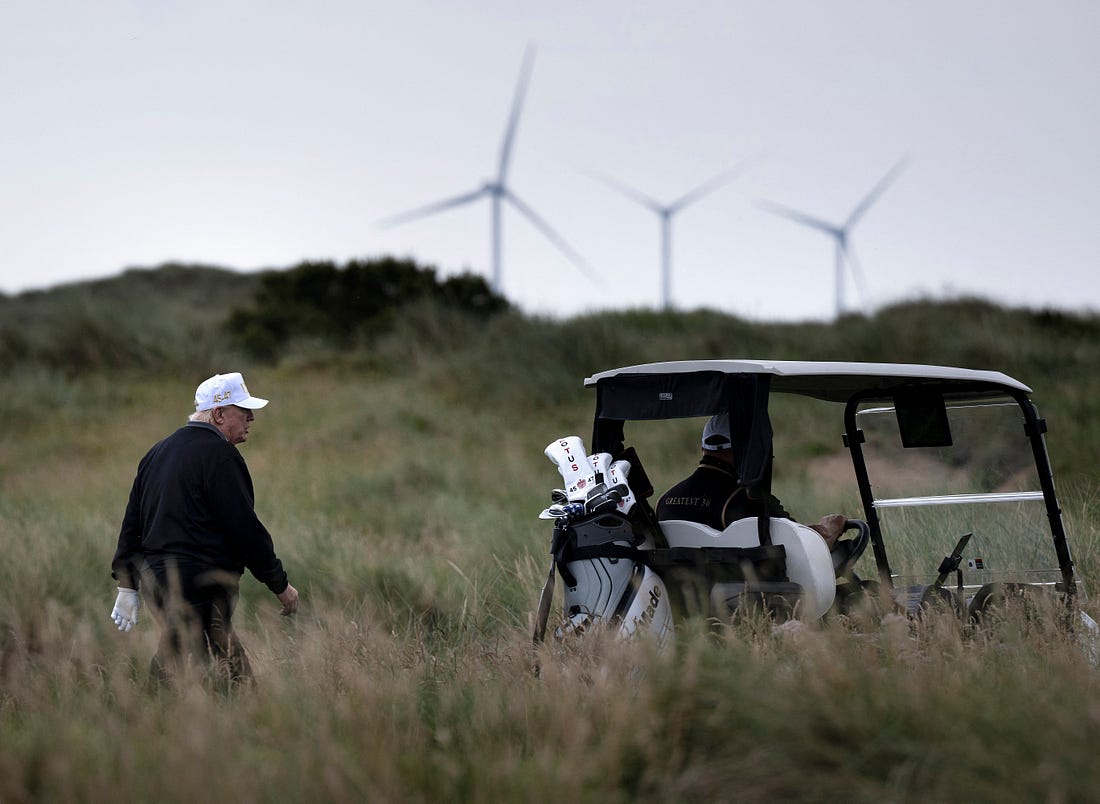Why Is The President Breaking Wind?A glimpse of the elective monarchical system that now defines America.
One of the greatest motivations for the American Revolution was the disdain for government that, in Ben Franklin’s words, was arbitrary: “I am a mortal enemy to arbitrary government and unlimited power.” Franklin was channeling Locke, who believed that creating an executive unbound by “settled standing Laws” was worse than anarchy. Arbitrary power was defined as “extemporary Dictates and undetermined Resolutions ... For all the power the Government has, being only for the good of the Society, as it ought not to be Arbitrary and at Pleasure.” “Arbitrary” and “at Pleasure.” In modern parlance, it’s a political leader doing something just “because I feel like it.” It’s a government whose rationale is entirely subjective and mercurial and disrupts the enforcement of “settled standing laws” for impulsive, personal reasons. Franklin became a hater of arbitrary rule when he was made an indentured servant to his much older brother for a nine-year term. I merely grew up in a family run by my dad like a tyrant: no explanations, no remorse, just a series of bad, dumb calls that nothing could reason him out of. The loathing of such arbitrary power is what makes an American American. It’s why the minute I set foot here, it felt like home. In the debate about how authoritarian Trump is, his sheer arbitrariness is under-rated. There are countless petty examples, but one stands out for sheer tenacious perversity: wind power and other renewable energy. There are plenty of reasonable arguments about how best to generate power and reduce carbon, the mix of sources, the pace of transition, etc. I’ve long favored an all-of-the-above approach while we transition to non-carbon fuel; others may differ. But it is close to impossible to discern a single, solid reason why wind power — one of the cheapest — should be singled out for arbitrary obliteration. But that is what is happening. With real gusto. Not so long ago, of course, Trump signed a 2009 letter in the NYT calling for massive, global investment in non-carbon energy, insisting that “if we fail to act now, it is scientifically irrefutable that there will be catastrophic and irreversible consequences for humanity and our planet.” In 2011, however, Trump found out his new golf course in Scotland would have a potent new offshore wind-turbine project on its horizon, so — surprise! — he lost his shit and wrote a letter to Alex Salmond, Scotland’s first minister at the time, calling it “disastrous and environmentally irresponsible.” In a Daily Mail op-ed, Trump escalated his feud with “Mad Alex”:
This is why a great nation’s entire energy policy is being turned upside down. It’s not the market; not the technology; not the Congress; not the courts; not the investment money; not the environment; not the lobbyists. There is, in fact, no consistent or coherent rationale — and everyone knows it. It’s because one man didn’t like one view and couldn’t get over it. That’s arbitrary power distilled like a fine Scottish whiskey. When Trump lost his battle with Salmond and the turbines were built (a whole documentary was made about the foofaraw), the psychic toll was just too much. In one of his own courses, Trump was compelled to see proof that he did not control everything, that he was a loser in a political battle, that other interests mattered other than his. The malignant narcissist is unable to let it go. (It’s why he refuses to recognize election results in which he loses.) So he made wind a mortal enemy:
If that sounds like a deranged ad hoc list, you’re right. Scotland — which merrily exploited North Sea oil for decades — now gets all its electricity from non-carbon sources, almost 80 percent of which are wind. The oil reserves will run out in a decade or two, but Trump doesn’t care: “Get rid of the windmills and bring back the oil!” he urged the UK this summer. As I have often noted, this is something you might hear from someone ranting drunk at a bar. But this is Trump sober. He has claimed that wind is “probably the most expensive form of energy.” In fact, wind has been the cheapest form of energy in the US for a decade. He also claimed that “they say the noise causes cancer.” No objective measurements of poorer health — except for being annoyed — can be found in studies. He also claimed they are causing the “programmatic” killing of bald eagles. Some eagles have been killed — up to 200 a year, in one study — but that is out of a total population of over 300,000, a population that has quadrupled since 2009, as wind turbines have tripled in number. “It’s driving [whales] loco, it’s driving them crazy,” Trump has also claimed. No evidence for that at all. Killing birds? Sure, that happens. One in 4,000 bird deaths can be attributed to turbines globally; and in the US, that amounts to about 538,000 deaths per year. But well over a billion birds are killed by buildings in the US each year. Is Trump going to propose banning skyscrapers? His views on wind power are, in the plain words of Chuck Grassley, “first of all, idiotic.” There are no good arguments — conservative or liberal — for destroying a growing industry that provides 10 percent of US energy, and in some states like Iowa, up to 60 percent. With energy prices rising, with AI demand imminent, we need all the energy sources we can get. But now look at how the entire US government has gone all out to make Trump’s personal, deranged fixation the settled policy of a great nation. On Day One, an executive order “paused all leasing of federal waters for offshore wind and paused new or renewed approvals for onshore or offshore wind projects on federal land until the outcome of a ‘comprehensive assessment and review of federal wind leases and permitting practices.’” No date for that assessment has yet been given. The Big Break-the-Budget Bill passed in July phased out the tax credits. Trump officials slashed the staff tasked for issuing new permits from 60 to 6. Then they piled on ever-more regulations to burden any new projects. They reversed a planned major wind project in Idaho. They just canceled $679 million of federal money for 12 new offshore wind projects. Next up: sabotage the turbines already built! Citing “national security interests”(!), the Trump peeps ordered a stop to Revolution Wind, off Rhode Island, which is already 70 percent completed and scheduled to start providing power next spring. But of course they didn’t say what those “national security interests” are. Permits are being abruptly pulled; government websites are going dark; and investors are obviously spooked. As one activist noted, “If you’ve gotten all your permits and spent billions of dollars, and even then they can pull the plug, well, who is going to want to put their money up?” I have left, for a moment, the deeper question of whether non-carbon energy is somehow wicked or wrong or pointless, whether man-made climate change is real. I think it obviously is, and requires urgent collective action. But even if you allow a policy of deliberately accelerating climate change as somehow defensible (which appears to be Trump’s policy), it’s impossible to glean even a scintilla of rationality in this bizarre, personal, and intense grievance against wind in particular. That’s arbitrary power: attempting to destroy an entire industry because of a personal grudge, tearing up previous agreements and investments arbitrarily, inventing reasons for stonewalling, rendering economics a secondary concern to appeasement of a mad king. What the country might actually need for the economy — after democratic deliberation, debate on a set of facts — is now subordinate to how the president feels, because of his personal beefs, weird fixations, batshit delusions, and clinical denial. We still have the trappings of republican government, in other words, but we are not living in a republic. We’re living in an elected monarchy where the whims and feuds and obsessions of a malignant megalomaniac are all that counts in the end. Franklin and the other Founders understood this so well. This isn’t a republic. It’s arbitrary power. It’s not America. It’s Trumpistan. (Note to readers: This is an excerpt of The Weekly Dish. If you’re already a paid subscriber, click here to read the full version. This week’s issue also includes: a chat about geopolitics with my college mate Niall Ferguson; many reader emails on Trump and the republic; nine notable quotes from the week in news, including an Yglesias Award for Malcom Gladwell; 17 pieces on Substack we recommend on an array of subjects; a Mental Health Break of Steely dan-cing; a striking view of an Icelandic harbor; and, of course, the results of the View From Your Window contest — with a new challenge. Subscribe for the full Dish experience!) From a freeloader no longer:
My latest column prompted another to jump off the fence:
Back On The Dishcast: Niall FergusonNiall is one of my oldest and dearest friends, stretching back to when we were both history majors and renegade rightists at Magdalen, Oxford. He is now the Milbank Family Senior Fellow at the Hoover Institution and a senior faculty fellow of the Belfer Center for Science and International Affairs at Harvard. He’s also the founder and managing director of Greenmantle LLC, an advisory firm. He’s written 16 books, including Kissinger, 1923-1968: The Idealist and Doom: The Politics of Catastrophe (which we discussed on the pod in 2021), and he writes a column for The Free Press. Listen to the episode here. There you can find two clips of our convo — a historical view on Trump’s authoritarianism, and the weakness of Putin toward Ukraine. That link also takes you to commentary on our recent pods with Johann Hari and Scott Anderson, as well as readers debating Trump and the state of the republic. Plus, another Truman centerfold. Browse the Dishcast archive for an episode you might enjoy. Coming up: Jill Lepore on the history of the Constitution, Karen Hao on artificial intelligence, Katie Herzog on drinking your way sober, Michel Paradis on Eisenhower, Charles Murray on religion, David Ignatius on the Trump effect globally, and Arthur Brooks on the science of happiness. As always, please send any guest recs, dissents, and other comments to dish@andrewsullivan.com. In The ‘StacksThis is a feature in the paid version of the Dish spotlighting about 20 of our favorite pieces from other Substackers every week. This week’s selection covers subjects such as the Fed war, American decline, and AI companions. Some examples:
Here’s a list of the substacks we recommend in general — call it a blogroll. If you have any suggestions for “In the ‘Stacks,” especially ones from emerging writers, please let us know: dish@andrewsullivan.com. The View From Your Window ContestWhere do you think it’s located? Email your guess to contest@andrewsullivan.com. Please put the location — city and/or state first, then country — in the subject line. Proximity counts if no one gets the exact spot. Bonus points for fun facts and stories. The deadline for entries is Wednesday at 11.59 pm (PST). The winner gets the choice of a VFYW book or two annual Dish subscriptions. If you are not a subscriber, please indicate that status in your entry and we will give you a free month sub if we select your entry for the contest results (example here if you’re new to the VFYW). Contest archive is here. Happy sleuthing! The results for this week’s window are coming in a separate email to paid subscribers later today. Here’s a sneak peek from our super-sleuth in West Orange:
See you next Friday. Invite your friends and earn rewardsIf you enjoy The Weekly Dish, share it with your friends and earn rewards when they subscribe. |





